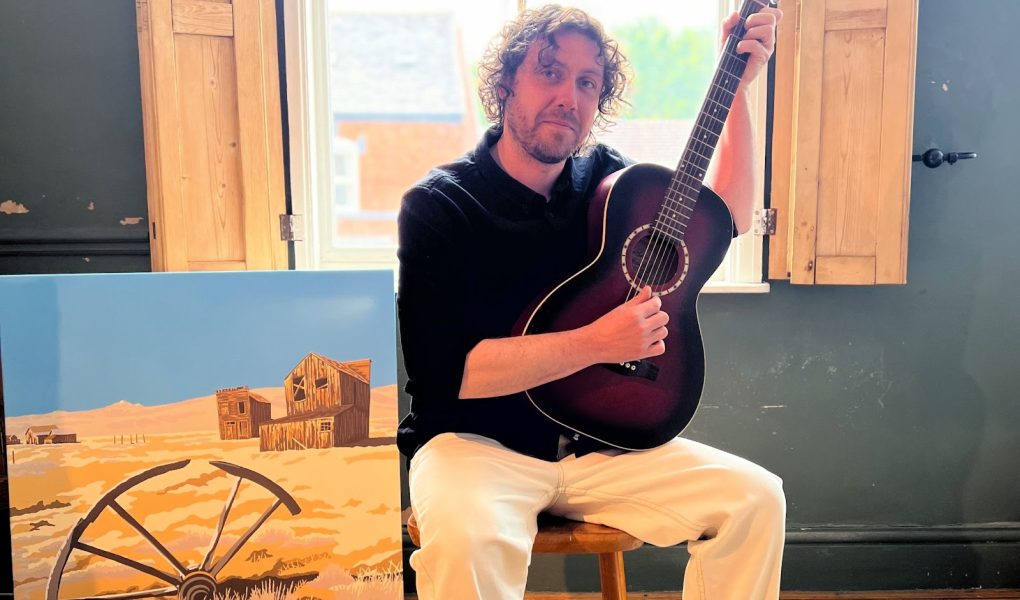Congratulations on the release of “Beyond The Sun Road” how does it feel?
Well, now. Thank you very much. To be perfectly honest, I’m absolutely thrilled with it. It took a long time to complete and now it’s finished it’s a huge weight off my shoulders. I can actually enjoy listening to it now without thinking about what it’s missing or what I can improve. It feels pretty soul-enriching to hear it and think to myself “Well Tuckey, that’s the best you could have done.”
It’s a 12-track album what was the easiest and hardest part of recording it?
The easiest was the song-writing. I say easy – it was part of a process of me relearning how to play guitar, how to use my voice in ways I hadn’t before and how to pay homage to particular genres and musicians. The recording was easy enough as I did it myself and with the musicians on the record. And it was the first time I’d pushed the limits of my recording and tracking skills to build complete songs. Basically, I got really into overdubs.
The hardest part of recording it is that most of my equipment is a bit basic. The songs were recorded on 4 or 8-track and the only decent mic was bought in a Black Friday deal. Plus, the studio I use is very busy. There are often bands rehearsing upstairs and sometimes I had to wait out their jam before doing a vocal take.
You recorded it with an array of musicians from Sheffield’s music scene how did you assemble them?
I’ve been playing in Sheffield for a long time so I know quite a few exceptional musicians. I simply said to some of them “I’ve written a song, fancy laying some tracks down?” They said yes.
Zebedee Budworth is a really versatile and efficient musician. You can set your watch by him. He tracked most of the drums and keys you hear on the record. Jim Ghedi is a very free-spirited musician. He seems to pick up an instrument and pull out chunks of gold effortlessly. So, I invited him down to lay down some saxophone on No Greater Love.
Some of it was more organic too. For instance, when recording the song Beyond The Sun Road, Zeb’s friend popped in to say hi and wound up laying down the bass.
What’s your favourite track from it?
That’s a harsh question! It’s like asking a parent who their favourite child is, which I do all the time to my friends. They try to give a diplomatic answer but ultimately, when the wife is out of the room, they let me know that child two has been a burden!
In the same spirit, I’ve put a lot of myself into this record so it’s hard to choose one. But when pushed, at this moment, it’s Dead Man’s .45. I wanted to write an original western story into a song and keep the tune moving, make it feel kind of cinematic. Plus, it’s got an awesome solo in the middle which I almost cut out. But I was convinced to keep it in at the last minute. I’m pleased I did as it’s got some of the best guitar work on the record.
You’re an artist, singer songwriter and novelist how did it all begin for you?
I went to school and they taught me how to write good. I moved on to writing short stories for my nan. Then she died and I had nowhere to send them. So, I published one of them instead.
I began learning guitar to get out of maths lessons at school. Turns out I wasn’t that bad at it so I started writing songs.
What did you listen to starting out?
At first, lots of Pink Floyd and Radiohead. Then, a great deal of hardcore and post-punk. Fugazi, Sonic Youth, Shellac, Jesus Lizard. And once I got my feet on American soil, I started following the progression of blues and country to see where it split off into various genres like R&B, Rock n Roll, and Rockabilly. It’s a fascinating journey.
You’re a novelist too, inspired by the humble Lincolnshire banger, what’s the connection?
I’m from Lincolnshire. If you head into a local butcher in Cleethorpes, you’ll find some of the greatest sausages to ever be bagged. Change in towns like that can be a hard sell. And it occurred to me that a butcher changing the recipe on his regulars could result in a great deal of bloodshed.
What’s your favourite Italian Western?
The Good The Bad and The Ugly. Cinematically, it’s a masterpiece. Musically, it’s a masterpiece. The story is awesome and the dialogue is full of killer lines. Overall, yeah, I’d say it’s a pretty decent film!
Being immersed in music and storytelling, when you hit a brick wall what do you do to break the deadlock?
If it’s a bit of creative block then I’ll head to the park, look at the view and smoke a joint. If I’m really struggling, burned out or overdoing it, I just stop completely and wait it out.
It’s also important to me that I have something to say. So, if I’ve dried up, then I take a long break, do something to enrich my soul then find out what I want to say about my experiences. One time I took four months off, went to South America and didn’t touch a guitar. When I came home I was so ready to go again that I didn’t stop writing for a few years.
What are you listening to at the moment?
70s Italian crime movie soundtracks and a never-ending run of Ennio Morricone.
What are you reading?
The script to Quentin Tarantino’s Reservoir Dogs. I finished Django Unchained recently too. I’d never read a script before and I was surprised how much I enjoyed the process. I want to write a script to my own song Dead Man’s .45 so I’m really looking for inspiration.
What’s next for you?
I’m in Calgary, Canada right now, where I’m preparing to play a gig on August 24th at High Line Brewing. I’ll be heading out on a road trip to Deadwood in South Dakota. And, at the end of the month, I’ll be premiering a short parody Western movie I made called Die Gringo, Die Again at a movie theatre in Calgary.
I’m also tantalisingly close to completing my next album. It’s just about done!




